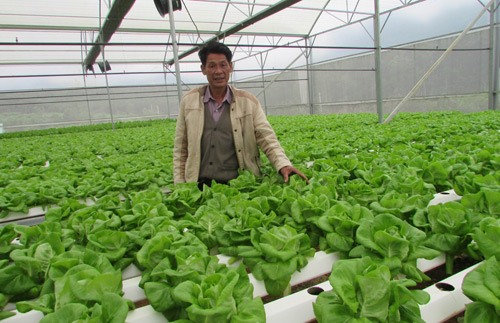City to invest in organic vegetable production
Da Nang’s agricultural sector plans to develop its greenhouse vegetable projects in the coming years.
 |
| Nguyen Thang at his greenhouse vegetable area. — Photo danviet.vn |
The goal is to create clean products, ensure large-scale production, link production and consumption, and improve the lives of farmers.
Local initiative at the core
Despite having a huge property in Da Lat City in the Central Highlands province of Lam Dong, Nguyen Thang decided to return to his hometown in Hoa Son Commune, Hoa Vang District, Da Nang, to invest billions of VND in growing greenhouse vegetables.
Thang told danviet.vn online newspaper that he received support from the local authorities and cooperated with local farmers to start greenhouse vegetable production in the communes of Hoa Phu and Hoa Ninh.
Thang started growing greenhouse vegetables since June 2017. After investing in machinery, infrastructure and the first production line, he established the VietGAP-certified Hoa Vang Vegetable and Flower Cooperative.
He was determined to grow high-quality vegetables and flowers. Since water source was important, he invested in an irrigation system in Hoa Ninh Commune. The quality of water was tested at Da Lat City’s examination centre.
Thang has grown greenhouse vegetables such as cucumber, melon, Japanese-seed pepper and Da Lat bellpepper.
He supplies clean agricultural products to the local market.
Some areas specialising in clean vegetables in Hoa Vang, such as Tuy Loan, La Huong and Hoa Tien, also supply a large amount of clean agricultural products to consumers.
Appealing for investment in high-tech agriculture
Nguyen Duc Tan, the Chairman of Hoa Ninh Commune Farmers’ Association, said the model of growing clean vegetables using advanced technology was bringing about economic efficiency.
“However, wide application is not easy as it requires investors to meet certain economic criteria. Currently, local authorities are calling for more investment in high-tech vegetable models,” he said.
According to him, developing greenhouse vegetable areas in Hoa Ninh Commune in future needs an investment of 3 billion VND, besides local financial support.
“The commune plans to develop a 5ha greenhouse vegetable area in future. Hoa Ninh will be the centre of high-tech vegetables and agricultural products,” Tan said.
Nguyen Phu Ban, the Director of the Da Nang Department of Agriculture and Rural Development, said the city had the strategic advantage of being located at the centre of Viet Nam’s central region and being a tourism hub, it had a huge demand for clean agricultural products.
As a result, every year the city purchased some 75,000 tonnes of fruits, 55,000 tonnes of vegetables, 35,000 tonnes of poultry and 10,000 tonnes of aquaculture products from the nearby provinces.
To keep a check on the origin of products, the city has cooperated with the five provinces of Lam Dong, Tien Giang, Gia Lai, Quang Nam and Binh Dinh to successfully implement the supply chain of safe vegetables, fruit and meat.
“The city is also encouraging enterprises to invest in high-tech and safe agricultural production with many preferential policies to form areas specialising in clean agricultural products.
“The investors will get up to 50% support in the cost of land clearance and investment cost of production facilities (including factory, equipment, production, preservation and irrigation system).
“Investors will be supported 100% of the loan interest rate for three years, with a maximum loan of 10 billion VND per project,” Ban said.
Reportedly, the municipal People’s Committee has approved the planning of seven hi-tech agricultural development zones. These include a hi-tech safe vegetable production area in Hoa Ninh Commune (35ha), Hoa Phu Commune (22ha) and Hoa Phong Commune (20ha); livestock and poultry breeding areas in Hoa Bac Commune (320ha) and Hoa Khuong Commune (30ha); herb planting area in Hoa Phu Commune (3ha); and a mushroom production and medicinal plant area in Hoa Quy Ward (1ha).
(Source: VNS/DA NANG Today)